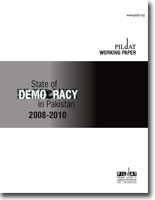The State of Democracy in Pakistan: 2008-2010, a working paper by PILDAT, has been compiled as a result of the assessment carried out by a diverse group of Pakistani citizens based on an international democracy assessment framework at the conclusion of the 2 years of the democratic government in Pakistan after the February 2008 General Elections. The working paper has been compiled using the criteria developed by the International Institute of Democracy and Electoral Assistance – IIDEA. This is the first time that the Democracy Assessment framework has been used to evaluate democracy in Pakistan. This working paper, therefore, provides a baseline on the subject on a criteria that is internationally comparable. This working paper should be viewed as a work-in-progress. The framework used to assess the quality of democracy in Pakistan is a tool to promote democratic reform. The framework does not assess the government alone but assesses the entire society looking at how democratic is the country and society of which the government is a part. PILDAT, which has been producing annual State of Democracy reports since 2002, believes that after the restoration of the form of democracy through the February 2008 General Election, the society must strive to improve and strengthen it. It is a collective responsibility that Democracy must deliver and succeed as poor quality of democracy may disappoint people and may lead to yet another failure and ‘derailment’ of democracy. PILDAT initiative to assess the quality of democracy in Pakistan is a modest yet significant effort to make democracy deliver and work. A diverse group, known as the Democracy Assessment Group, has been put together by PILDAT involving representatives from major political parties and groups, government representatives, academics, media, thinkers and civil-society, to utilize an international democracy assessment framework so that democracy assessment does not offer partisan commentary and unreliable analysis but is a genuine effort to provide an objective, informed and non-partisan democracy assessment. PILDAT gratefully acknowledges the support and cooperation of evaluators, including Parliamentarians, opinion leaders, scholars and the media persons, etc. PILDAT sought and received partial support of the Foundation for the Future in carrying out the assessment of democracy which it gratefully acknowledges. PILDAT Team has made every effort to ensure the accuracy of data and assessment in this Working Paper and any error or ommission is not deliberate.
State of Democracy in Pakistan 2008-2010
PILDAT Working Paper







